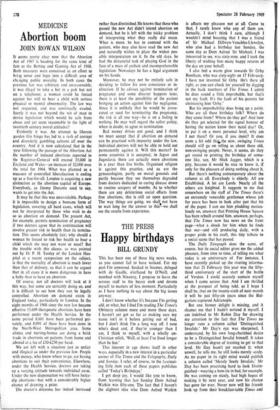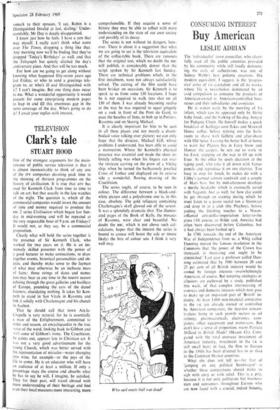Happy birthdays
THE PRESS BILL GRUNDY
This has been one of those big news weeks, as you cannot fail to have noticed. For my part I'm unmoved. Soaked in Soames, deluged with de Gaulle, o'erfaced by O'Neill, and numbed with Nixonry, I propose to leave the serious stuff to the heavy mob and devote myself to matters of less moment. Particularly as I have nothing to say about the big issues anyway.
I don't know whether it's because I'm getting old, or what, but I find I'm reading The Times's Obituary column more and more these days. I haven't yet got as far as making sure my name isn't in it before getting out of bed, but I don't think I'm a long way off. I note who's dead and, if they're younger than I am, I think to myself, with a wholly un- Christian relish, 'Well, at least I've lived longer than he has.'
This interest in age shows itself in other ways, especially in a new interest in a particular corner of The Times and the Telegraphs, Daily and Sunday. I refer, of course, to the fascinat- ing little item each of these papers publishes called 'Today's Birthdays.'
I got deep joy, I would like you to know, from learning that last Sunday Dom Aelred Watkin was fifty-one. The fact that I haven't the slightest idea who Dom Aelred Watkin is affects my pleasure not at all. Come to that, I rarely know who any of them are.
Actually, I don't think I care, although I wouldn't mind boasting that I was a friend of Sir Michael Dillwyn-Venables-Llewelyn, who also had a birthday last Sunday, the same day as Dom Aelred. Sir Michael, I was interested to see, was sixty-nine, and I took the liberty of wishing him many happy returns of the day on your behalf.
I also feel a warm glow towards Sir Orby Bootham, who was sixty-eight on 17 February.
I have not invented Sir Orby. He's there all right, as you can check for yourself by digging in the back numbers of The Times. I admit he does sound a little improbable, but that's not my fault. It's the fault of his parents for christening him `Orby.'
But his improbability does bring up a point. Who are all these birthday folk? Where do they come from? Where do they go? And how do they get selected for the signal honour of having the nation know their natal day? Or, to put it on a more personal level, why am I not there? Or you, if you insist? It does
seem a bit odd thal„the new, swinging Times
should still go on telling us about these old, non-swinging people. Never, it seems, do they get round to printing the birthday of some- one like, say, Mr Mick Jagger, which is a pity, because it would be nice to know it, if only for the pleasure of doing nothing about it.
But there's nothing contemporary about the column at all. Everybody is elderly. All are Established. A lot are Lords. Nearly all the others are knighted. It suggests to me that somewhere on the staff of The Times there's an extremely venerable gentleman whose job for years has been to look after just that bit of the paper. I can see him plodding meticu- lously on, unaware that Printing House Square has been rebuilt around him, unaware, perhaps, that The Times now has news on the front page—what a shock for him when he finds that out—and still producing daily, with a proper pride in his craft, this tiny tribute to a social scene that has passed.
The Daily Telegraph does the same, of course, but its social editor gives me the added pleasure, from time to time, of telling me what today is an anniversary of. For instance, I have recently picked up the riveting informa- tion that 21 February this year was the fifty- third anniversary of the start of the battle of Verdun. I could scarcely contain myself
when I came across that. And I am thrilled at the prospect of being told, as I hope I shall be, that on the twenty-sixth of next month it will be just fifty-six years since the Bul- garians captured Adrianople.
But one former delight is missing, and it shames me that I hadn't noticed it myself. I
am indebted to Mr Robin Day for drawing
my attention to the fact that The Times no longer runs a column called 'Distinguished Invalids.' Mr Day's eye was sharpened, I
understand, by his own long-cherished desire to be a Distinguished Invalid himself. It takes a considerable degree of training to get to that level. Mr Day hasn't yet reached it; when unwell, he tells me, he still looks merely seedy.
As no paper in its right mind would publish a column called 'Merely Seedy Invalids,' Mr Day has been practising hard to look Distin-
guished—wearing a bow-tie in bed, for example. He was coming on nicely, had high hopes of making it by next year, and now his chance has gone for ever. Never now will his friends look, up from their breakfast-table Times and
remark to their spouses, `I say, Robin is a Distinguished Invalid at last, darling.' Under- standably, Mr Day is deeply disappointed.
I know just how he feels. I have a yen that way myself. I really can't think what came over The Times, dropping a thing like that. Any morning now we'll be finding that they've dropped Today's Birthdays' as well, and that the Telegraph has quietly ditched the day's anniversary piece. And that will be too much.
For how are we going to get along without knowing what happened fifty-seven years ago last Friday, or who to send a greetings tele- gram to, or who's ill and Distinguished with it? I can't imagine. But one thing does occur to me. What a wonderful opportunity it would present for some enterprising modern paper to leap in and fill this enormous gap in the news coverage of the day. Who's going to do it? I await your replies with interest.



































 Previous page
Previous page